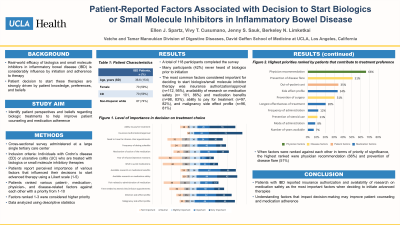Monday Poster Session
Category: IBD
P2226 - Patient-Reported Factors Associated with Decision to Start Biologics or Small Molecule Inhibitors in Inflammatory Bowel Disease
Monday, October 23, 2023
10:30 AM - 4:15 PM PT
Location: Exhibit Hall

Has Audio
.jpg)
Ellen J. Spartz, MD
UCLA
Los Angeles, CA
Presenting Author(s)
Ellen J. Spartz, MD, Vivy Cusumano, MD, Jenny Sauk, MD, Berkeley Limketkai, MD, PhD
UCLA, Los Angeles, CA
Introduction: Real-world efficacy of biologics and small molecule inhibitors in inflammatory bowel disease (IBD) is considerably influenced by initiation and adherence to therapy, which are in turn strongly driven by patient knowledge, preferences and beliefs. The aim of this study was to better understand patient perspectives and beliefs regarding biologic treatments to help improve patient counseling and medication adherence.
Methods: A cross-sectional survey was administered at a large single tertiary care center to participants with a history of IBD and biologic/small molecule inhibitor therapy use. Participants reported perceived importance of various factors that influenced their decision to start advanced therapy using a Likert scale (1-5). Participants also ranked various patient-, medication-, physician-, disease-related factors against each other in terms of level of priority from 1-10. Factors ranked 1-3 were considered higher priority. Descriptive statistics was used to analyze relative importance of patient-reported factors.
Results: A total of 118 participants completed the survey. Their mean age was 36.6 years (± 15.6), 70 (59.3%) had Crohn’s disease (CD), 70 (59.3%) were female, and 87 (73.7%) were white. Many participants (42.3%) never heard of biologics prior to initiation. The most common factors considered important to deciding to start biologic/small molecule inhibitor therapy was insurance authorization/approval (n=112; 95%), availability of research on medication safety (n=101; 86%) and medication benefits (n=98; 83%), ability to pay for treatment (n=97; 82%), and malignancy side effect profile (n=96; 81%) (Figure 1). The factors deemed least important, although still prevalent, included fear of infusions (n=51; 43%), wish to avoid medications (n=60; 51%), and pain related to administration of medication (n=61; 52%). When these factors were ranked against each other in terms of priority of significance that determined treatment of preference, physician recommendation (66%) and prevention of disease flares (51%) had the highest priority (Table 1).
Discussion: When deciding on initiation of advanced therapies, patients with IBD report insurance authorization and availability of research on medication safety as the most important factors. As patients are often unaware advanced therapies prior to discussion with their physician, understanding factors that impact decision-making may improve patient counseling and medication adherence.

Disclosures:
Ellen J. Spartz, MD, Vivy Cusumano, MD, Jenny Sauk, MD, Berkeley Limketkai, MD, PhD. P2226 - Patient-Reported Factors Associated with Decision to Start Biologics or Small Molecule Inhibitors in Inflammatory Bowel Disease, ACG 2023 Annual Scientific Meeting Abstracts. Vancouver, BC, Canada: American College of Gastroenterology.
UCLA, Los Angeles, CA
Introduction: Real-world efficacy of biologics and small molecule inhibitors in inflammatory bowel disease (IBD) is considerably influenced by initiation and adherence to therapy, which are in turn strongly driven by patient knowledge, preferences and beliefs. The aim of this study was to better understand patient perspectives and beliefs regarding biologic treatments to help improve patient counseling and medication adherence.
Methods: A cross-sectional survey was administered at a large single tertiary care center to participants with a history of IBD and biologic/small molecule inhibitor therapy use. Participants reported perceived importance of various factors that influenced their decision to start advanced therapy using a Likert scale (1-5). Participants also ranked various patient-, medication-, physician-, disease-related factors against each other in terms of level of priority from 1-10. Factors ranked 1-3 were considered higher priority. Descriptive statistics was used to analyze relative importance of patient-reported factors.
Results: A total of 118 participants completed the survey. Their mean age was 36.6 years (± 15.6), 70 (59.3%) had Crohn’s disease (CD), 70 (59.3%) were female, and 87 (73.7%) were white. Many participants (42.3%) never heard of biologics prior to initiation. The most common factors considered important to deciding to start biologic/small molecule inhibitor therapy was insurance authorization/approval (n=112; 95%), availability of research on medication safety (n=101; 86%) and medication benefits (n=98; 83%), ability to pay for treatment (n=97; 82%), and malignancy side effect profile (n=96; 81%) (Figure 1). The factors deemed least important, although still prevalent, included fear of infusions (n=51; 43%), wish to avoid medications (n=60; 51%), and pain related to administration of medication (n=61; 52%). When these factors were ranked against each other in terms of priority of significance that determined treatment of preference, physician recommendation (66%) and prevention of disease flares (51%) had the highest priority (Table 1).
Discussion: When deciding on initiation of advanced therapies, patients with IBD report insurance authorization and availability of research on medication safety as the most important factors. As patients are often unaware advanced therapies prior to discussion with their physician, understanding factors that impact decision-making may improve patient counseling and medication adherence.

Figure: Figure 1: Level of importance in decision on treatment choice
Disclosures:
Ellen Spartz indicated no relevant financial relationships.
Vivy Cusumano indicated no relevant financial relationships.
Jenny Sauk indicated no relevant financial relationships.
Berkeley Limketkai: Azora Therapeutics – Consultant, Stock-privately held company.
Ellen J. Spartz, MD, Vivy Cusumano, MD, Jenny Sauk, MD, Berkeley Limketkai, MD, PhD. P2226 - Patient-Reported Factors Associated with Decision to Start Biologics or Small Molecule Inhibitors in Inflammatory Bowel Disease, ACG 2023 Annual Scientific Meeting Abstracts. Vancouver, BC, Canada: American College of Gastroenterology.
